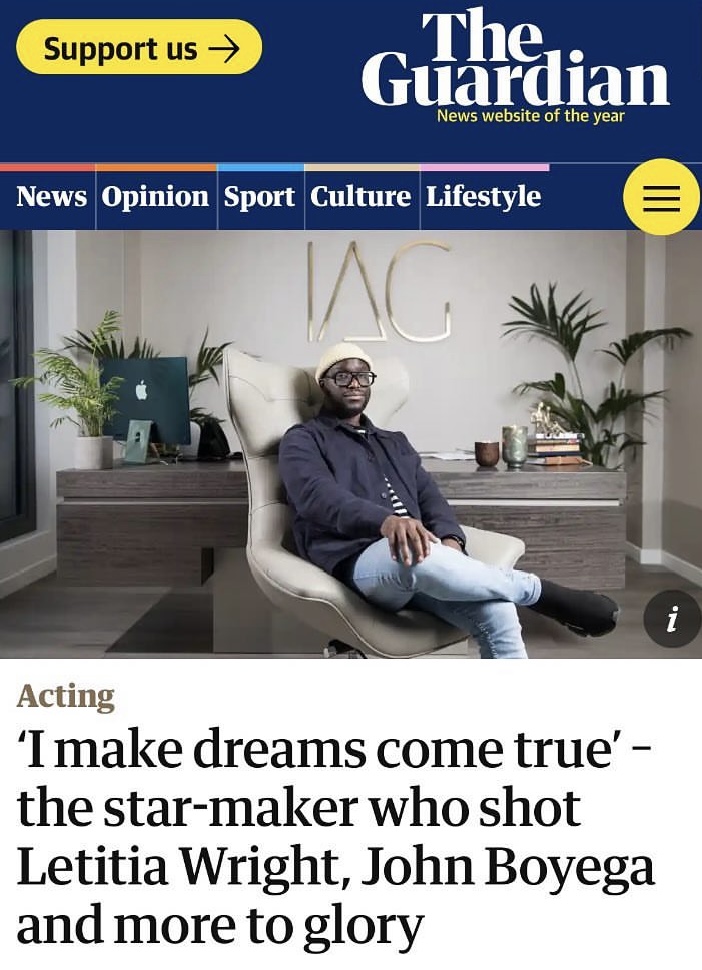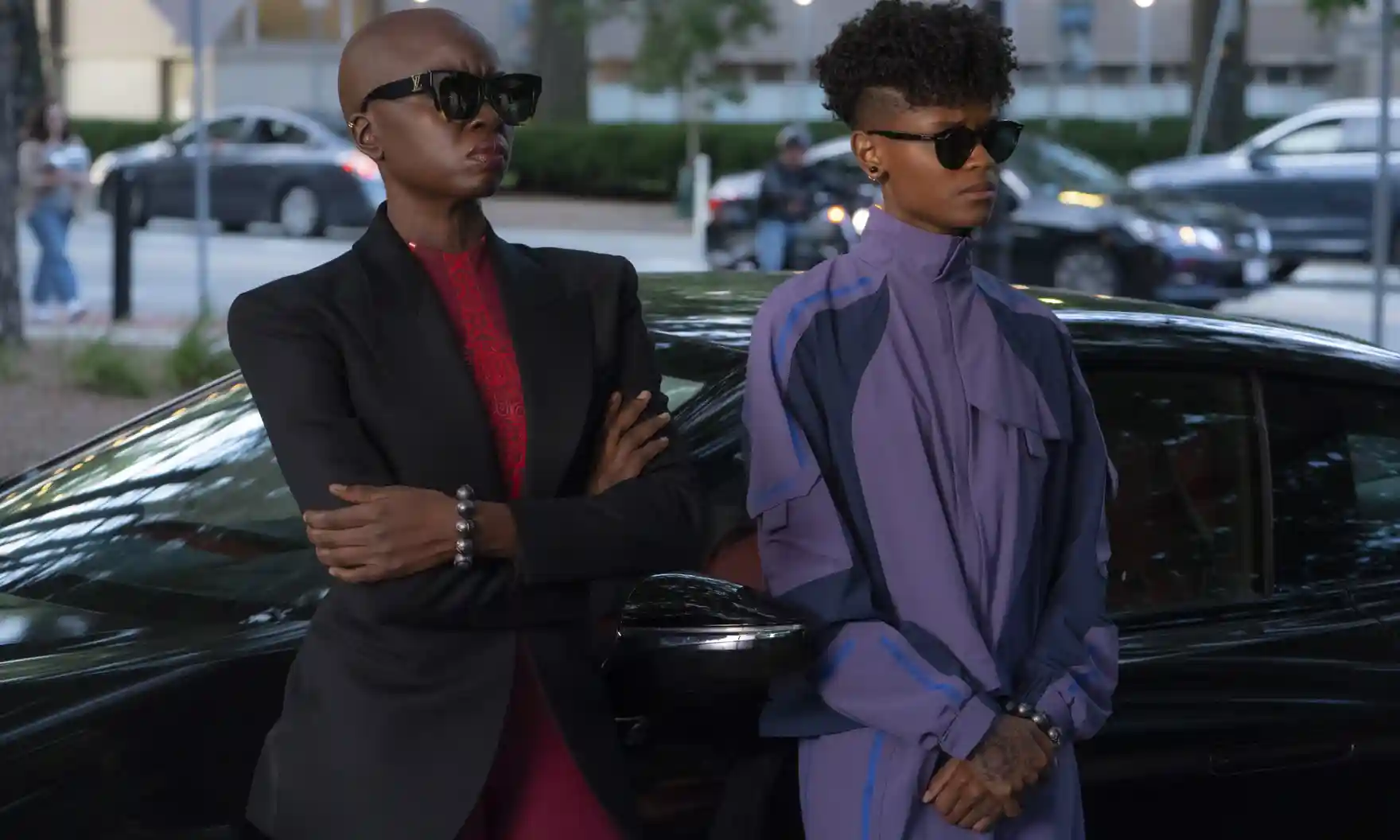As Wright pulls on the Black Panther catsuit, we meet Femi Oguns, whose acting school started two decades ago with a handful of flyers – is now Hollywood’s go-to talent hotspot!
A few days before she was cast as Shuri in Black Panther, Letitia Wright told Femi Oguns that she already knew she’d got the role. As a graduate of Oguns’ Identity School of Acting, Wright had been close to him and his family since she was a teenager and was staying overnight at his house in London at the time. “In the morning,” recalls Oguns, “she sat down and said, ‘Femi, I’m going to tell you something: I got the role.’ I said, ‘What, they told you?’ And she was like, ‘No. But I’ve got the role.’ Somehow she just knew. And I believed her.”
Sure enough, two days later, Marvel called confirming that Wright had indeed landed the role that would change her life. This week, Wright steps even further into the spotlight – and the Black Panther catsuit, after the premature death of Chadwick Boseman – in the sequel Black Panther: Wakanda Forever.
“We’ve got people who have been here for one term. We’ve got people who have been here for nine years.”
Oguns was not entirely surprised by Wright’s prophecy: partly because he had seen her potential when she enrolled at Identity, aged 16. He describes her as “a needle in a haystack”, adding: “She was a very, very shy individual, but there was an inner life, an inner experience, an inner journey that she had gone through at such a young age that she was able to pour into her practice.”This is not the first time one of Oguns’ students has found spectacular success. A year above Wright was John Boyega, who in 2014 pulled off a similar coup by landing the role of Finn in Star Wars: The Force Awakens. Like Wright, and many others, Boyega was an aspiring Black British actor who felt shut out of the mainstream drama-school system – exactly the sort of person Oguns set up Identity for. “Seeing John take a role like that – everybody realised, ‘Oh my God, anything’s possible.’”
Identity, based in London, celebrates its 20th anniversary next year. Its founder can take pride in having found quite a few needles in the haystack: its alumni also include Michaela Coel, her I May Destroy You co-star Weruche Opia, as well as Bridgerton’s Regé-Jean Page and Bridgerton 2’s Simone Ashley (also in Sex Education). Chances are, if Oguns turned on the TV these days, he would spot one of his graduates – in anything from EastEnders and Call the Midwife to Black Mirror and House of the Dragon. Having started from nothing, the 45-year-old is now something of a power player, not just in the British entertainment industry but also in Hollywood. Where once he had to fight and beg for roles for his actors, now the top agencies come calling.
Oguns could well be entitled to play the mogul, leaning forward in a wing-backed white leather chair in his Soho office – but he’s really not that sort of character. Energetic, talkative and down to earth, Oguns takes a paternalistic pride in his students’ achievements, but he expresses it more in terms of gratitude: “Just being a part of that journey, whereby you can help make their dreams a reality, that’s what’s the motivating force,” he says. “The only agenda was to create a landscape where actors of colour, and others, could celebrate their identity through acting, and not be limited.”
Oguns’ own experience of limitations is what set him on this path. The eldest son of a British-born Nigerian mother and a Nigerian immigrant father, he had a stable upbringing in London, and fell in love with acting via summer courses at the Black-centric Talawa Theatre Company. But as one of only two non-white students in his year at drama school (he prefers not to name it), he felt he was given stereotypically Black roles, the general attitude being, “OK, great, we’ve got you in order to tick a box, but we don’t see actors of colour as being a success, so we’re not going to really invest in you.” He left after a year to study race, culture and performing arts at university. All the while, Oguns was getting acting roles, albeit minor ones: “My claim to fame was playing the lead alongside Helen Mirren in Prime Suspect.”
It all came together, he says, in a moment of divine inspiration: “People kind of switch off when you mention your faith in God, but I can only speak my truth. And it was this: I just got hit by a bolt of lightning. God said to me, ‘Femi you’re doing your acting, and stuff like that, but your calling is to represent those people, by creating a safe haven where they can celebrate their identity.’”
Oguns started with nothing but a bunch of flyers, which he handed out in “areas that were filled with people who looked like me”. The flyers had a phone number and a question: “Would you like to be taught by acting coaches that have been in The Bill, EastEnders and Casualty?” There was only one acting coach, though: Oguns himself. Identity had no other employees. When he answered the phone, he would adopt the alias “Philip Dempsey” and talk in a posh accent. Just 10 people turned up to Identity’s opening session. Today the school has about 700 students: roughly 50% Black, 25% Asian and 25% white. There are another 300 in the US.
“The school is like a training camp,” he says. “We have people running around the block three times and then they run into the class – ‘Boom! We’re going to start.’ It’s always about trying to find a completely different approach.” Equally unusual is Identity’s flexibility in terms of course length and fees. “We’ve got people that have been here for one term. We’ve got people that have been here for nine years.” And, unlike regular drama schools, Identity is not full-time: “If you can put a lot on the front end – in the training, the nurturing, the developing, and keep it at a low price – not only are you going to be able to attract people that are marginalised, you’re also going to be able to make your money on the back end.”This is where Oguns’ Identity agency comes in. In the early days, the school’s graduates would often find agents and enter the industry only to find stereotypical roles on offer. “There you are holding a knife,” he says. “There you are holding a gun. There you are feeding into African, Caribbean or Asian stereotypes.” A 2016 survey by the British Film Institute found that 60% of British films made in the preceding decade did not feature a single Black character.
In 2011, when Wright auditioned for her first job, in the hospital soap Holby City, she was the only Black woman in the room. She got the role, but not without a fight – it had simply not occurred to anyone that the character did not have to be white. Oguns has had many such arguments: “I’ll challenge casting directors and say, ‘So why can’t that person be Black?’ Not all Black people walk, talk, eat or are in pain the same way.”
The situation has changed markedly in the past decade. “Diversity,” says Oguns, “is the new buzzword.” Rather than accepting actors of colour just to tick a box, he says, drama schools are actively courting them, as is the rest of the industry. “I feel as though we have largely contributed to this massive shift, on screen and on stage, whether people care to admit it or not, because we were unapologetically fulfilling something that had never been done before.” He also prides himself on the fact that Identity is “an absolute beast when it comes to negotiations”.
There is still work to be done, though. Boyega has said he felt his Star Wars character was “pushed to the side” once the studio had received plaudits for casting him, in ways white characters weren’t. The fact Boyega was vocal in the UK Black Lives Matter protests at the time may have been relevant. Boyega and Oguns are still good friends and Identity has a studio named after the actor. “I’m glad he stood up the way he did,” says Oguns. “But by the same token, I do feel Disney have now woken up. And the universe is a better place for it.”
Hollywood has also woken up to the fact that many of the plum roles for Black actors have been going to Brits: not only Boyega but also David Oyelowo, Daniel Kaluuya, Idris Elba and Chiwetel Ejiofor. “You know what?” he says, “I’m partly responsible.” By way of appeasement, though, he set up the Los Angeles branch of Identity in 2018. “For me, it’s all about quality,” he told his US students. “I feel as though I have a responsibility to give you guys the same quality teaching, so that you’re on an equal footing.”
Oguns has continued expanding. His school launched a production arm in 2019 and, last year, Netflix pledged to sponsor 30 year-long scholarships at Identity. Oguns is also excited about the 250-seat theatre Identity is opening next year in London.
“I’ve got a bit more oil in the tank,” he laughs. “I just want to be part of making history. I’ll never be a slave to the dollar. I’m not one of those ones with ego, or that wants to be one of the richest people in the world, because I believe half of them are not that happy anyway. I think happiness is just having peace.”
MORE NEWS FROM THE BLOG




